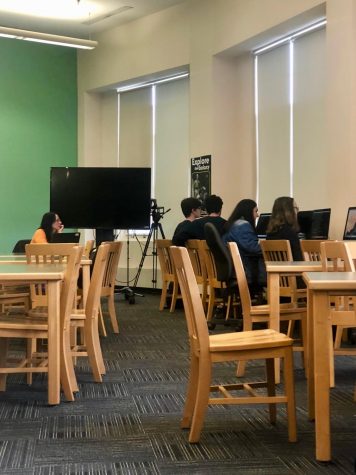The Focus Issue
December 11, 2018
You’re sitting in class, staring at the clock, counting down the minutes before it is over; this is a familiar experience for many students. High school students greatly suffer from attention deficit issues, and by no fault of their own. Attention spans, or lack thereof, are often attributed to teenagers slovenly disposition which is a fundamental attribution error when in reality the biology of adolescents and the structure of working and learning environments are the factors responsible for inhibiting high school students from successfully paying attention and retaining information.
Around half-way through seventy-minute period classes, it is entirely reasonable for students to mentally “check-out.” I spoke with adolescent psychiatrist Corey Myers who explained how “taking breaks during study times is important because your brain needs breaks in order to retain any new information successfully… Many teachers, unfortunately, fail to allow break times during class time” which can result in a decrease in the percent of acquired information, which subsequently causes the decline in retained information. This further extends to the issue of an over-diagnosis of ADD and ADHD in adolescents in children. Dr. Myers explained that “when teenagers are not given that opportunity to take a break and let all the newly acquired information sit in their brains, they are not learning the material, so they do not do well on assignments and see a slip in grades. Many parents view this as ADHD and look for the quick band-aid fix of stimulants, which can cause more harm to students than if they were set up to be successful in classroom settings”.
Factors outside of the classroom also play a huge role in students’ focus. Things such as sleep and diet greatly affect someone’s ability to focus. This comes as no surprise to the majority of the high school population. “Students biological clocks are preset to become tired around 11 o’clock and in order to get the recommended 8-10 hours of sleep; that sets you at a wake-up time of between 7 and 9 am. High Schools generally have a start time of 7:45, which is way too early for students to be able to focus adequately”. The American Academy of Pediatrics recommends a start time of 8:30 for high schools for students to get enough rest to allow them to be more successful. Implementing later start times has a direct correlation with the increase in students focus.
The environment in which you are learning or working in, whether that be in the classroom or at home, is also crucial in determining the success of one’s memory acquisition and retainment. As explained by Dr. Myers, “if you are in a loud, distracting environment, obviously you’re not going to get any work done. What isn’t so obvious is that a lot of parents encourage their kids to their work on the dining room table or some other common area in the house. This generally isn’t a quiet place to accomplish anything.” It is nearly impossible to learn and retain new information with the usual distractions that come from the classroom or home environment. Dr. Myers suggested that “the best environment for productivity is a bright, quiet place.”
Not only is the environment in which you are completing work in critical, but the order in which you complete your work is essential as well. Many high school students are guilty of falling into the thinking trap of finishing the most straightforward work done to get it out of the way, and then tackling their more difficult assignments at the end of their study session. Dr. Myers debunked this misconception through explaining how “it is much more effective for you to use the most possible brain power to complete the harder assignments rather than the least amount of your brain power at the end of completing work.”
To sum it all up, it’s easy to attribute high school students difficulty focusing to their lazy and unmotivated disposition; however, that simply is not the case. If schools were to implement later start times, constructed break times into class schedules, and provided productive work environments, students ability to focus would significantly increase subsequently causing greater academic success and well-being.


Network Support Dallas • Dec 12, 2018 at 2:02 am
I think that one of the biggest things you have to include is ergonomics and efficiency. One often feeds into the other when it comes to office comforts, i have found. Thanks for these tips. I really liked the tip about positioning desks in front of windows.
Network Support Dallas